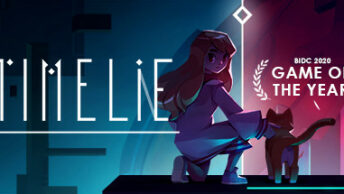It’s hip to be square-ish
Type: Singleplayer
Genre: Strategy
Developer: PiedPipers Team
Publisher: NEOWIZ
Release date: 9 Apr, 2020


Grand strategy games can be incredibly intimidating to get into. Even those marketed to children, like Svea Rike 3/Crown of the North are not very approachable. Plebby Quest: The Crusades tries to change that, with a friendlier aesthetic and more straight forward mechanics.
Plebby Quest is set in a close(ish) approximation of the time of the crusades. Your goal is to lead your chosen nation to greatness, through warfare, diplomacy, science and all that other good stuff that you would expect from a grand strategy game, all while trying to keep your economy in check, and your people happy. This is done in either free play mode, where you pick between one of several different regions & nations, or a campaign mode, where you’ll go through three story campaigns.
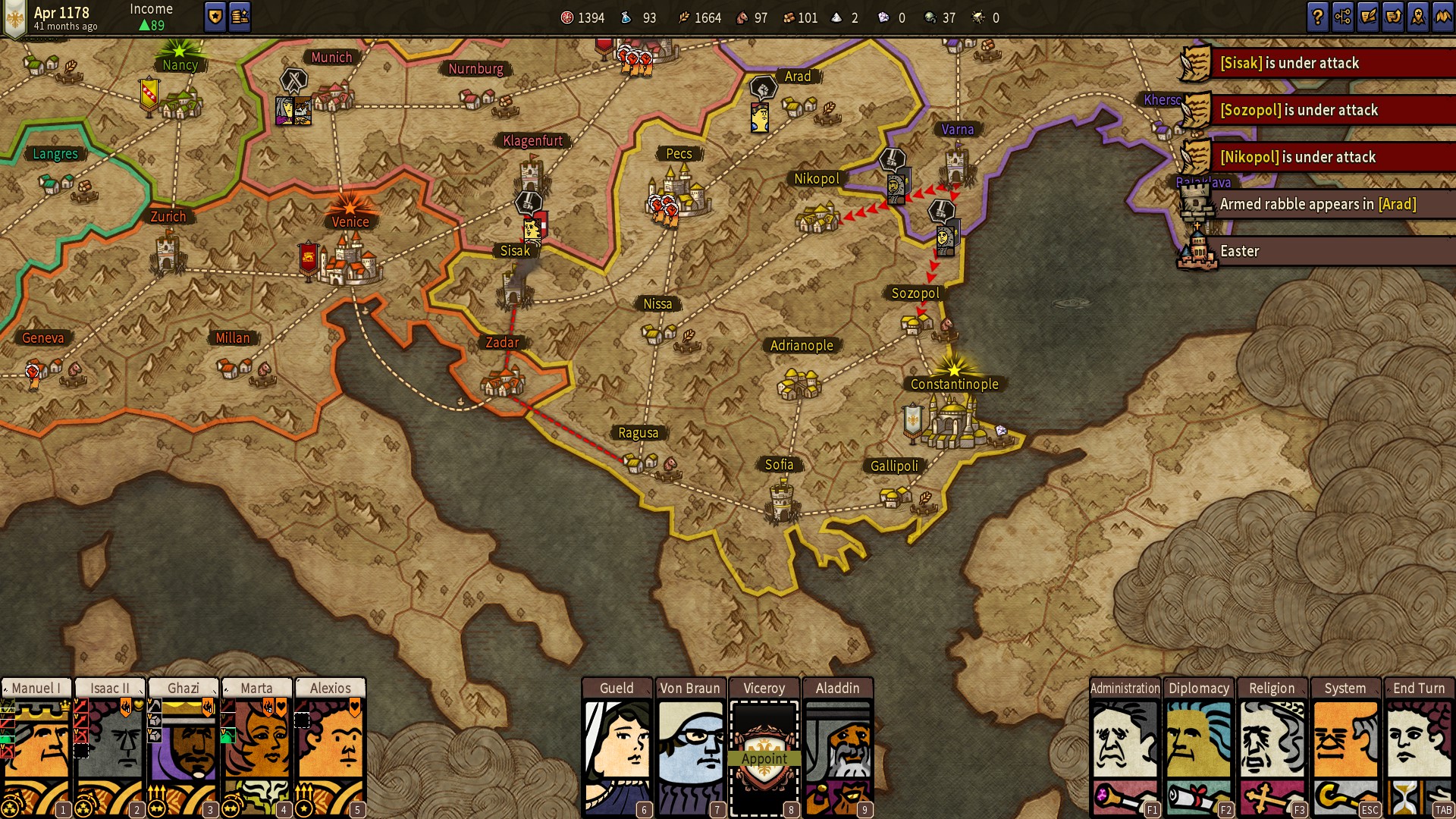
Story & setting
Set during the crusade in Europe, North Africa and the Middle, Plebby Quest sees you leading a nation to glory (or ruin). Many of the major nations at the time, like the Holy Roman Empire, Saxony, Seljuk Empire and so on, are represented here, with their rulers being cartoony caricatures of their historical counterparts (or just characters people are familiar with from that region). These are not always exactly contemporary though, and some of the characters would have lived hundreds of years apart.
The game also takes other liberties with history. The Mongols arrived early, there are witches covens who want you to do stuff for them, one character is a lion and so on. If this was a film, it would say it’s “inspired by historical events”, that’s how historically accurate it is. And there’s nothing wrong with this, as taking this “inspired by history” approach gave the developer a lot more freedom in how they wanted to approach things. It lets them get away with things like having militarized plague doctors, without it seeming out of place.
The free play mode does not have much in the way of a story, you’re just on a quest to take over whatever part of the map you’re playing on. The story campaigns, on the other hand, do have a heavier emphasis on story and characters. You’re still leading a nation, but every few turns you’ll get interrupted by events or characters wanting to speak to you (or about you), and these are often very silly. You have characters like Kilij Arslan II talk about Rock ‘n Roll, and Machiavelli arguing about the existence of the Flying Spaghetti Monster with Roger II of Sicily. The tone of these story segments is often a bit irreverent, but so silly that even if the characters involved happen to be your absolute favourite historical characters, it’s hard to really be offended.
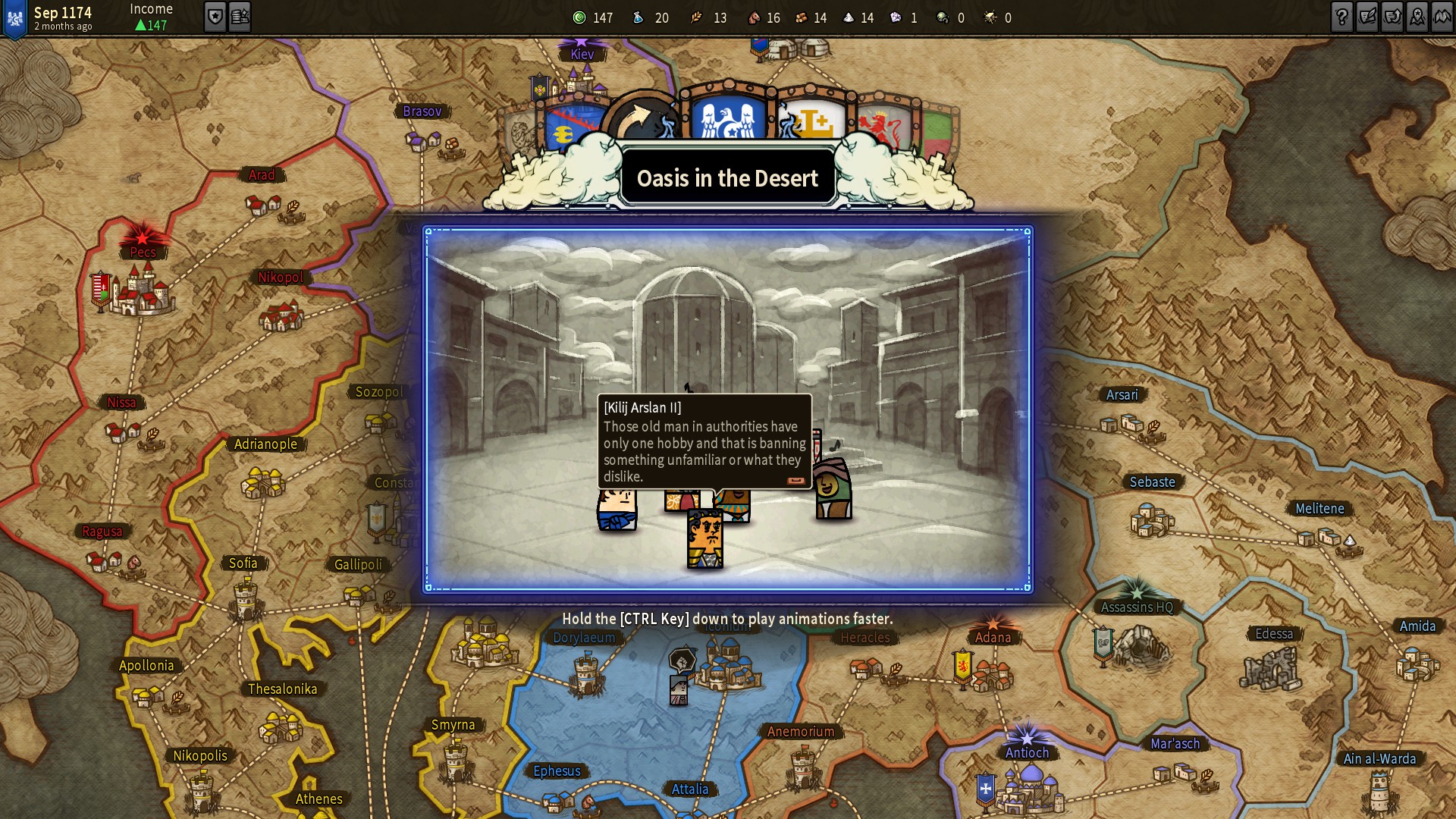
Graphics & sound
As you can see in the screenshots, Plebby Quest goes for a highly stylized look. All named characters are represented by rectangles with pictures on them, that bend, deform or have different emanate to show emotions and feelings, while soldiers look like armed twinkies with legs and faces. It’s a very consistent look, and the way the characters are drawn gives them a lot of personality, even if it’s not the most technically impressive graphics. There are a lot of liberties taken with these drawings of these characters though, and one would be hard-pressed to identify most of them. The rest of the graphics is not bad either. While the map itself is kind of boring looking on its own, the lack of colour works very well with the rest of the game, as it makes borders easy to see, and any colours that are there pop.
The games music is pretty good overall. There are no tracks that are outstanding, but they work well as background music, and the music usually complements the action well. The games sound effects are similar, they’re not outstanding, but they give good feedback and are not very intrusive.
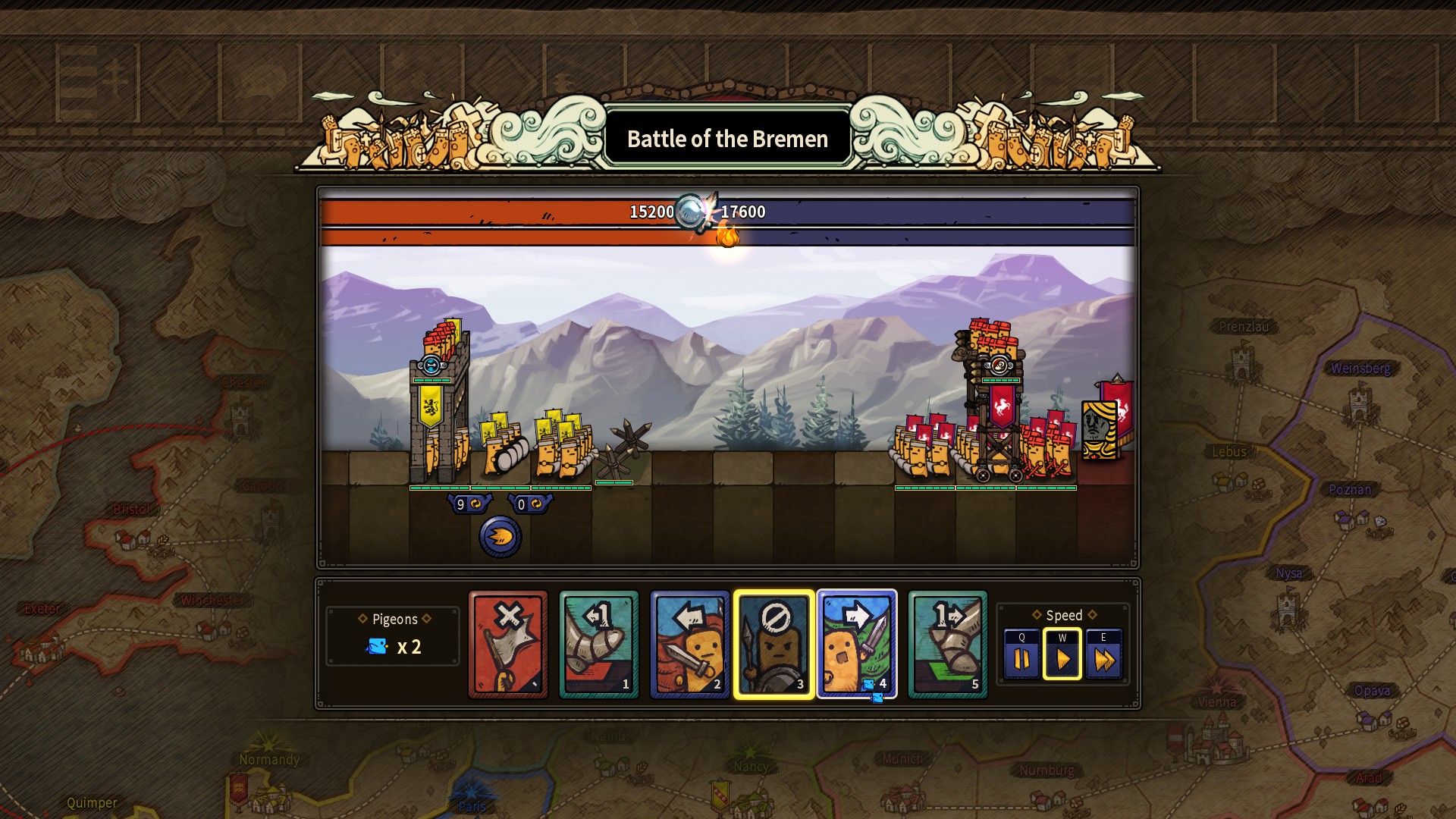
Gameplay
In Plebby Quest your goal is to take over the world! Or at least the part of the map you’re playing on. If you have ever played a Total War game, the basic ideas here should seem familiar. You start as a nation that has just a handful of provinces, and then grow bigger, by taking land from your neighbours, and use the resources that you get to get larger armies of better troops. But exactly how you do this is quite different.
Most of the things you do will be done with one of your generals. As you grow larger, you’ll be able to recruit more generals. Every turn each general can do one action, and this can be a wide number of things. You can try and get more research points, police your provinces to deal with unrest, recruit more generals, and of course fight the enemy. Using your generals effectively is a key part of the game, and you want to make sure that they’re always doing something useful that takes you closer to victory.
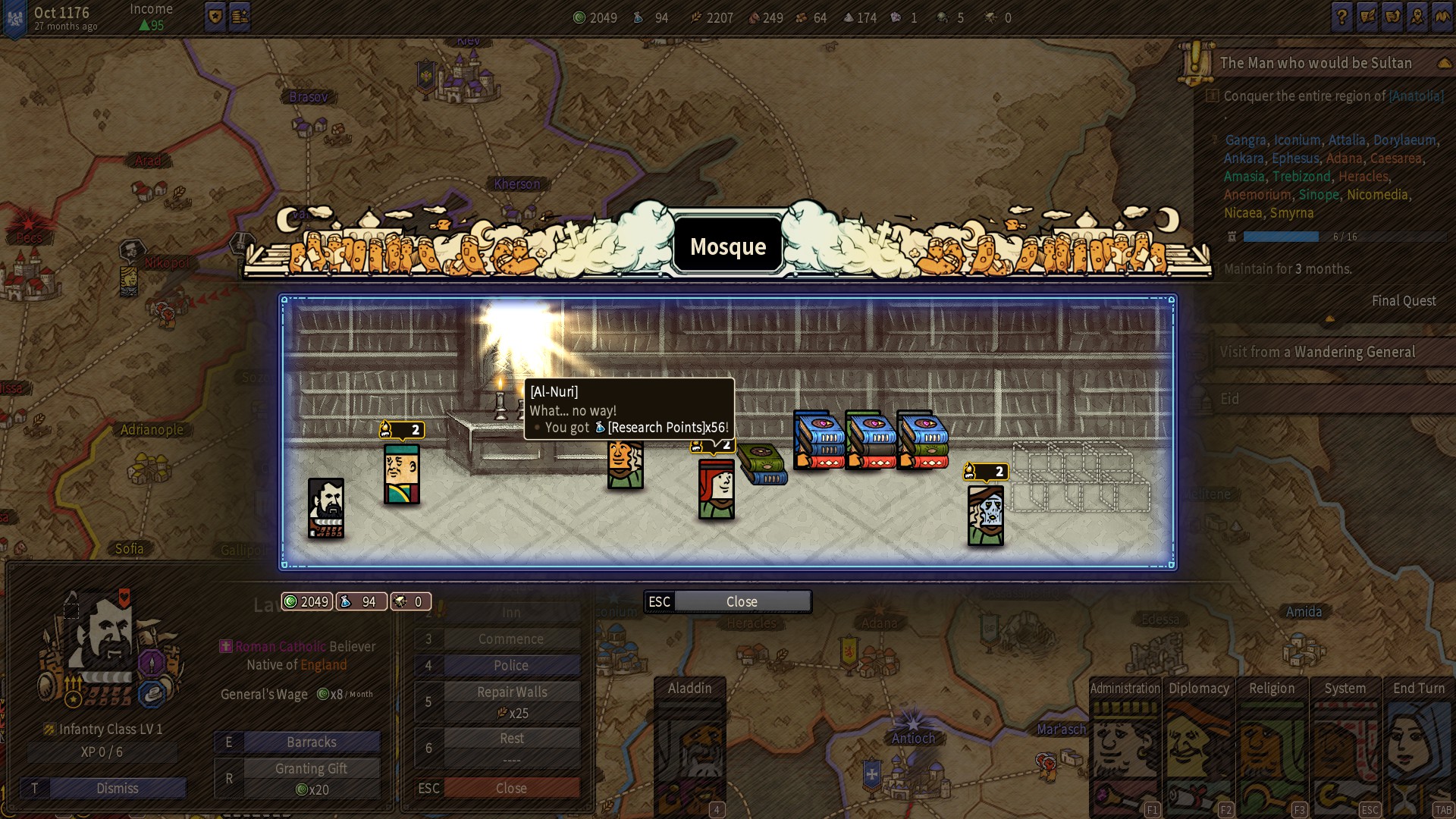
Most, but not all, actions taken by your generals comes with a small minigame of sort. Getting more research for an example involves stacking books and trying to get 3 in a row, while recruiting another general involves playing a variant on the classic tabletop game Mastermind. Even fighting is pretty much a minigame in itself, as you move your troops forwards & backwards on a 2D plane, and try to deal as much damage to the enemy as you can, while not losing your whole army. Most fights are not very decisive, you’ll put a dent in the opponent’s army, but to finally beat them, and take over their territory, you need to repeatedly attack them until you’ve weakened them enough to finally win.
Apart from using your generals, there are also a few “free” actions that you can take, like investing those research points into valuable research, forming diplomatic ties with the nations around you, buying resources and so on.
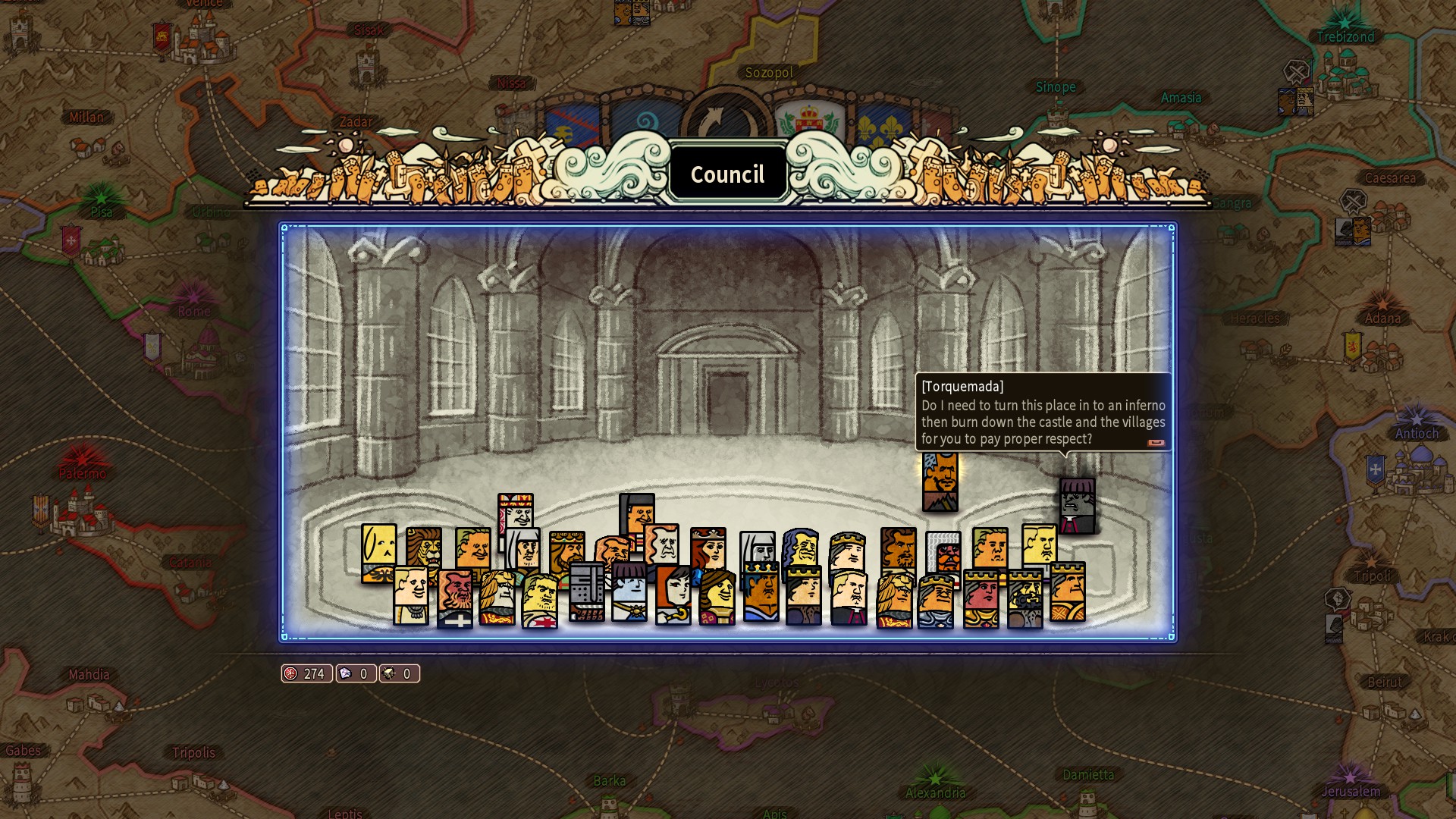
There are also a few things that can happen between turns. A national council might be called, which lets you select between a few different simple missions, or there can be a religious council where you can vote on excommunicating or condemning other nations. The later involves another minigame, where you try to sway people to vote for your side.
As you can see there are plenty of minigames involved in Plebby Quest, but there are more strategic elements as well. Fighting the enemy is expensive, and good resource management is important. The better the units you have, the more expensive it will be to send them into a fight, as well as restoring losses, and you might simply not have access to certain resources, and thus need to trade for them from one of the merchants that shows up periodically. Resource management is not a big problem early on, but once you start having troops that have been upgraded to higher tiers, being able to afford to use them can be tricky. Managing the pace you expand in is also important, as other nations might not be too happy with you if you start conquering everything around you, and getting dragged into several wars at once is usually something you want to avoid.
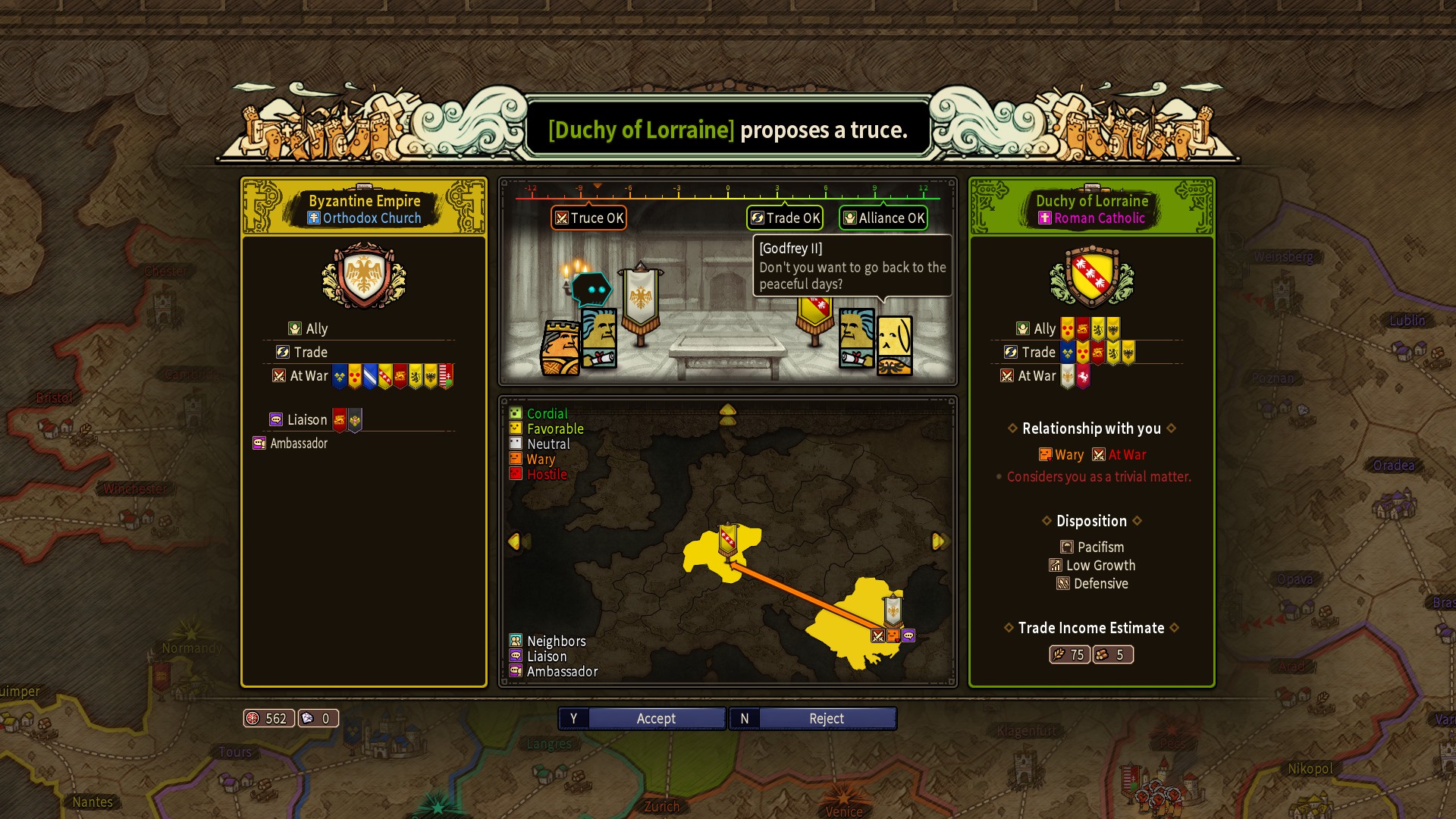
There are also some differences between story mode and free play mode. In free play mode you’re free to do things as you see fit, start whatever wars you want, and set your own goals, while in story mode you have a series of objectives you need to accomplish. These ranges from gathering resources, to researching specific techs to conquering specific land and so on.
The focus on minigames is something that makes Plebby Quest rather unique in the grand strategy scene, no other game really does this, and it’s both the games main strength, and weakness. They really do feel like a breath of fresh air, if you come games like Total War and Europa Universalis, and require a different set of skills than of most other strategy games, while still not really harming the strategic element of the game, but once you’ve done a minigame 20 times, it starts feeling a bit tedious. The AI can also sometimes do things that make no sense, like declaring war on you despite being on the other side of the map, with no way of attacking you in the next 100+ turns. This strange and nonsensical behaviour seems to be due to how the AI handles the relationship with other nations. If it gets too low, it will declare war, even if declaring war won’t do anything.
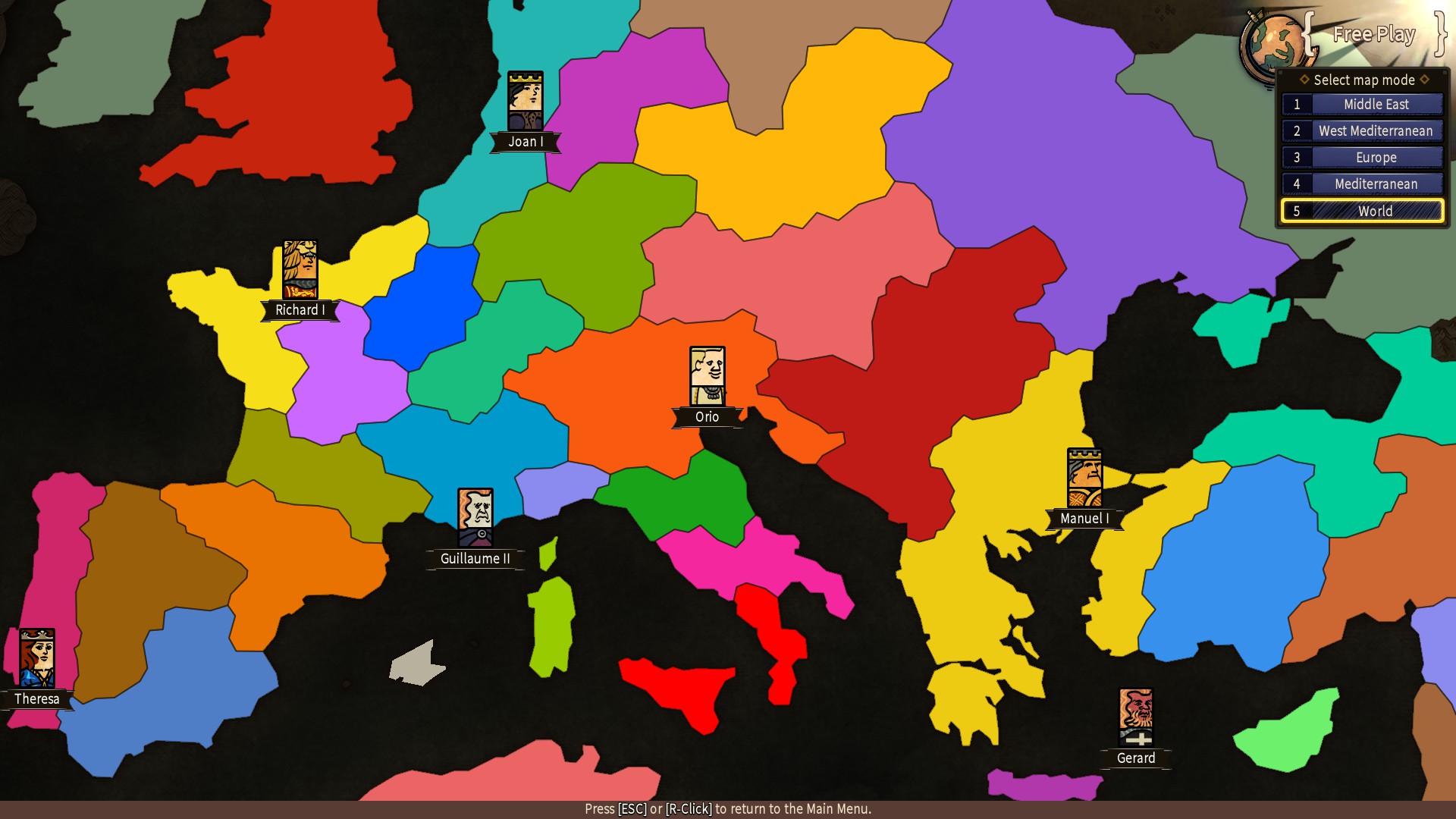
Closing thoughts
I really wish I liked Plebby Quest more than I do. The game is by no means bad, but the heavy emphasis on minigames does make it a bit tedious to play for longer periods of time. It’s also a bit annoying to have to sit through the voting process for who gets excommunicated or condemned when the nation that’s being affected is on the other side of the map. If I’m playing the Byzantine empire, I really don’t care if France gets into trouble in the early stages of the game. An auto-resolve button would come in really handy here.
It might sound like I’m needlessly down on the game here, and in a way I am, but I want a good game like this, a good entry point into the grand strategy genre, that strips away a lot of the complexities that puts people off, and Plebby quest is so nearly there. But there are a lot of things that work in this game. The art style is charming, the strategic layer is simple, but not shallow, and there are a lot of little things you can do in the game. I did not go through all the actions you can take earlier in the review, because there are simply too many of them. And when played in short bursts, this game is pretty good, but this is the kind of game that’s worth playing, but probably not worth beating, because by the time you reach the end game, you’ll likely have grown bored with the minigames and repetitive combat.







